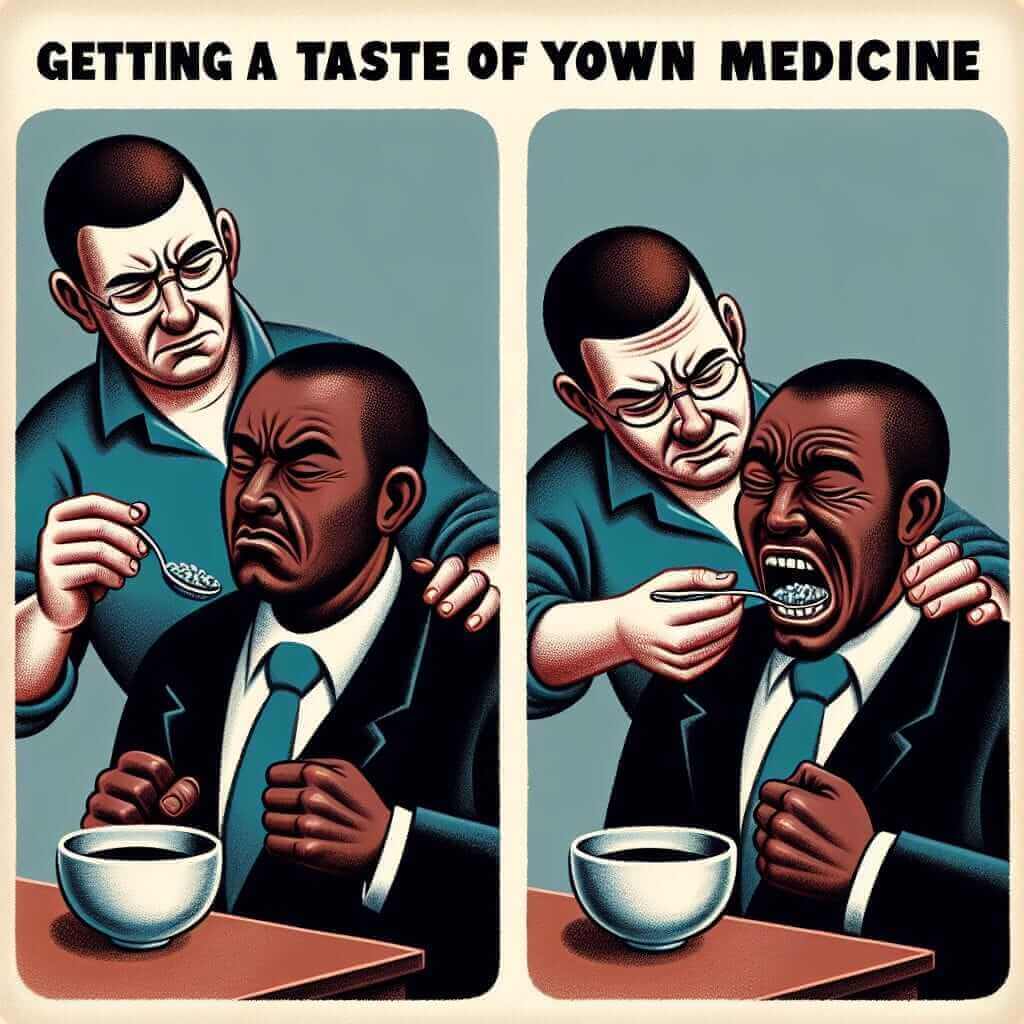The idiom “get a taste of your own medicine” is quite common in English and appears frequently in both spoken and written texts. It means that someone is experiencing the same unpleasant treatment that they have given to others. Understanding and using this idiom can enhance your vocabulary and improve your performance in the IELTS exam. This article will delve into the usage, meaning, and possible IELTS applications of this phrase, along with relevant lexical fields and examples.
Here are some synonymous and antonymous expressions that align with the idiom “get a taste of your own medicine”:
-
Synonyms:
- Reap what you sow /riːp wɒt jə səʊ/ (idiom): to suffer the consequences of your actions.
Example: If you cheat, you will reap what you sow sooner or later. - What goes around comes around /wɒt ɡəʊz əˈraʊnd kʌmz əˈraʊnd/ (idiom): your actions will eventually come back to you, good or bad.
Example: He treated his friends poorly, and now what goes around comes around.
- Reap what you sow /riːp wɒt jə səʊ/ (idiom): to suffer the consequences of your actions.
-
Antonyms:
- Let bygones be bygones /lɛt ˈbaɪɡɒnz biː ˈbaɪɡɒnz/ (idiom): to forget past offenses or conflicts.
Example: While they disagreed in the past, they decided to let bygones be bygones.
- Let bygones be bygones /lɛt ˈbaɪɡɒnz biː ˈbaɪɡɒnz/ (idiom): to forget past offenses or conflicts.
Understanding the Phrase
Definition and Pronunciation
Get a taste of your own medicine /ɡɛt ə teɪst ɒv jɔːr əʊn ˈmɛdɪsɪn/ (idiom): to experience the same unpleasantness that one has inflicted on others.
Example:
After making fun of others, he finally got a taste of his own medicine when someone made fun of him.
Detailed Analysis
This idiom metaphorically suggests that the treatment (“medicine”) one administers to others can be unpleasant when they experience it themselves. This can be crucial for understanding underlying themes in reading or listening sections of the IELTS exam, as well as for impressing examiners in the speaking and writing sections with your range of vocabulary.
Frequency in IELTS
The idiom “get a taste of your own medicine” and its variations often appear in the context of:
- Essays or articles about justice, fairness, or karma.
- Conversations talking about reciprocal actions or retribution.
- Literature and storytelling, emphasizing themes of poetic justice or comeuppance.

Sample IELTS Application
Writing Task
Here’s an example of how you can use “get a taste of your own medicine” in an IELTS writing task:
Topic:
Some people believe that punishment should fit the crime. To what extent do you agree or disagree?
Answer:
In many cultures, there is a belief that those who have wronged others will eventually get a taste of their own medicine. This ideology supports the notion of reciprocal justice and is often reflected in systems where punishments are proportionate to the offenses. For example, someone who constantly bullies others might find themselves friendless and isolated, thereby suffering the same treatment they imposed.
Speaking Task
In the speaking section, you could use this idiom in your responses to demonstrate your grasp of idiomatic language:
Question:
Describe a time when you felt that you were treated unfairly.
Answer:
I remember a time at school when a classmate was always making fun of me. Eventually, he got a taste of his own medicine when another student started doing the same to him. Watching this unfold, I realized the importance of treating people with kindness and respect.
Combining with Other Vocabulary
To maximize your IELTS score, it’s effective to combine the idiom with other relevant vocabulary. Here are some keywords and phrases to enhance your writing and speaking:
- Karma: The belief that actions affect one’s future.
Example: Believing in karma, she was confident that he would face consequences for his actions. - Reciprocal: Given or felt by each toward the other.
*Example: Their relationship was built on reciprocal respect and admiration.
Related Idioms
- Taste of one’s own medicine: A variation of the same idiom.
Example: He finally got a taste of his own medicine when his boss treated him unfairly. - Live by the sword, die by the sword: Another idiom denoting equal retribution.
Example: Those who harm others often find that they live by the sword, die by the sword.
By integrating these expressions and idioms into your preparation, you’ll be better equipped to tackle both the language and thematic challenges of the IELTS exam.
Conclusion
Understanding idioms like “get a taste of your own medicine” is crucial for achieving a high band score in the IELTS exam. This idiom, along with its synonyms and related phrases, can be employed effectively in various sections of the test. By practicing these expressions in context, you can improve your comprehension and usage, thereby enhancing your overall performance.
For more detailed explanations and additional examples, you can refer to related articles:
By using such resources, you will broaden your vocabulary and improve your ability to articulate ideas clearly and idiomatically.